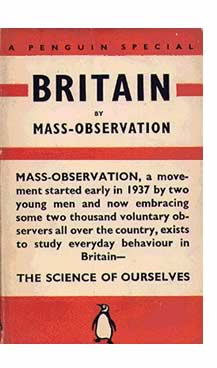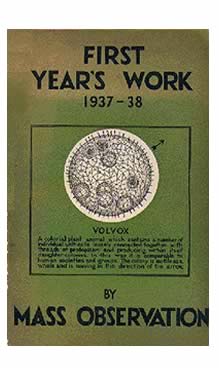Recording/Observing
The Poet Recorder ; Mass Observation
Founded in 1937 by the anthropologist Tom Harrison and the poet, Charles
Madge, Mass Observation was dedicated to recording the British national
life in minute detail. Other participants were the painters William Coldstream,
Graham Bell, the collagist Julian Trevelyan, the photographer Humphrey
Spender, and the film maker Humphrey Jennings.
Mary-Lou Jennings, Humphrey Jennings, Film-Maker Painter Poet
, BFI London 1982.
David Mellor writes, "One guise which reconciled the twin demands
of the Surrealist and the Documentarist was that of the Poet Reporter.
In his BBC broadcasts of 1938, on the general theme of Poetry and the
Public, Jennings posited a unity which once existed in English literature
before the advent of the mass media in which the poet was a kind of reporter;
and poet-reporter was in fact the title adopted by Charles Madge during
these years, echoing the Utopian hopes of Mass Observation to have reconciled
science and art after their separation brought about by the Industrial
Revolution. " Jennings' film Spare Time (1939) was partly set in
Bolton, much studied by Mass Observation.
For a general
survey of the Thirties, see Clark et al, Culture and Crisis in
Britain in the 1930's , Lawrence and Wishart, 1979 see also Sylvia
Harvey, "Who wants to know what and Why", Ten 8 , No.23
BRITAIN arranged by Charles Madge and Tom Harrison, Penguin Books, Harmondsworth
1939 180 x 110 cms. ABOVE
Humphrey Spender speaks in the film. In his book Lensman,
he writes, " [Tom Harrison] believed as I did that press photography
was largely falsifying and irrelevant. MO was committed to `study real
life' and for this purpose the concealed prying camera was essential...At
our disgusting breakfasts in the smelly parlour of our headquarters house,
Tom Harrison would talk me into taking my camera to christenings, Holy
Communions, pubs, railway stations, public lavatories. Away from headquarters
I was very much on my own, sometimes, frightened, embarrassed, bored and
depressed. To the working people of this town my manner of speaking was
la de fucking da . To me their language and accent was foreign."
"Democracy is not simply an inherited freedom to do what you like
or what others like to supply. It inevitably involves, among other things,
the intelligent operation of society for the optimum benefit of all the
people; and for this end the people need to be given every facility and
encouragement, both to ber informed in fact and to be capable of intelligent
decision in theory." Tom Harrison, Contact ,"The
Public's Progress", June 1947, p.xiii.
BOOKLIST
The First Year's Work ,Mass Observation 1937 (see above)
Mass Observation Day Survey May 12th 1937, Faber and
Faber London 1987 (1937)
Britain by Mass Observation ,Penguin, Harmondsworth 1939
Contact
, 1947,"Saturday Night by Mass Observation", pp.4-12, illustrations
by Gerard Hoffnung
Contact
March 1947, Faith and Fear in Postwar Britain, by Mass Observation,
pp.4-16
Contact March 1948, Don't know Don't Care, by Mass Observation,
pp.56-62.
Contact July 1949, Keeping up with the Jones's, by Mass
Observation, pp.41-45
Mass Observation, The Press and its Readers , Art and
Technics London 1949
Humphrey Spender, Lensman Photographs 1932-52 Chatto
and Windus London 1987
Humphrey Spender, Worktown People , Falling Wall Press,
1982.
exhibition
catalogue, The Thirties, Hayward Gallery London 1980
Mass Observation Anthology
The Archives of Mass Observation are in the collection of the University
of Sussex.
|





















